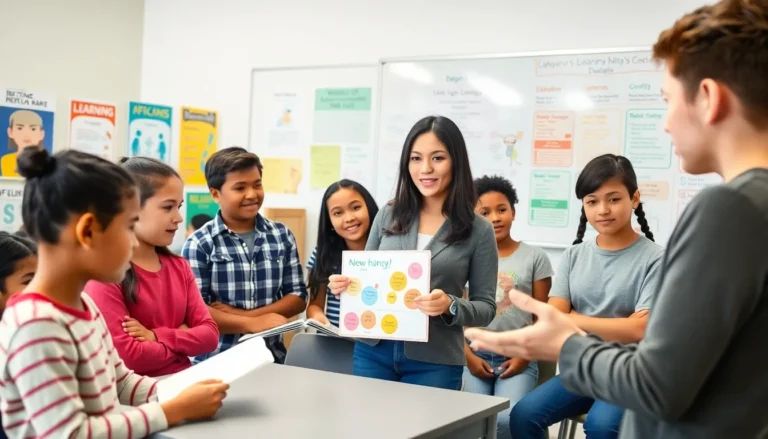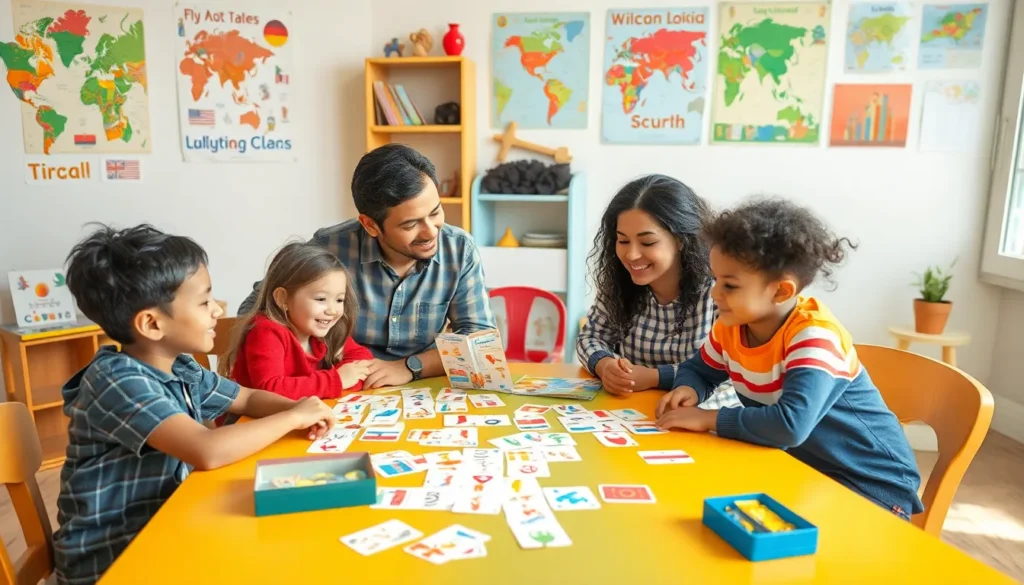Table of Contents
ToggleIn today’s interconnected world, learning a new language is more than just a skill; it’s a gateway to understanding diverse cultures and building stronger family bonds. Language classes for families offer a unique opportunity to embark on this journey together, making the process fun and engaging for all ages.
Imagine the joy of sharing a meal while practicing a new language or playing games that encourage learning. These classes not only foster communication skills but also create lasting memories as families navigate the exciting challenges of language acquisition side by side. With options available for various proficiency levels, families can find the perfect fit to enhance their linguistic journey and deepen their connections.
Overview of Language Classes for Families
Language classes for families offer dynamic learning environments where all members participate actively. These classes often incorporate interactive methods, such as games, songs, and storytelling, to keep learners engaged.
Families can expect tailored programs that cater to various proficiency levels, ensuring that everyone, from beginner to advanced, benefits from the experience. Classes typically focus on practical vocabulary and essential phrases, aiding in everyday conversations.
Many organizations provide multilingual options, allowing families to choose languages based on their cultural background or interests. Parents can reinforce classroom lessons at home through shared activities, fostering an enjoyable learning atmosphere.
Ultimately, language classes strengthen familial bonds by promoting collaboration. Shared learning experiences cultivate teamwork while creating precious memories, enhancing both language skills and family connections.
Benefits of Language Classes for Families

Language classes offer families numerous benefits, enhancing communication and understanding among members. Families gain valuable skills and insights through shared learning experiences.
Improved Communication Skills
Language classes improve communication skills among family members by providing practical vocabulary and essential phrases. Family members practice speaking together, fostering confidence in their abilities. Shared language learning creates opportunities for open discussions, reducing misunderstandings. Engaging in dialogues helps families articulate their thoughts, feelings, and needs more effectively. Families mastering a new language also enhance their cognitive abilities, which can contribute to better problem-solving skills.
Cultural Understanding
Language classes promote cultural understanding within families, exposing them to diverse perspectives and traditions. Families learn about cultural nuances, traditions, and practices associated with the language they study. This awareness fosters respect for different cultures and enhances empathy among family members. Engaging with various cultural texts, music, and cuisine during classes deepens appreciation for the richness of language. Families sharing these experiences together can create a strong sense of unity and connection, enriching their family dynamics.
Types of Language Classes Available
Families can choose from various language classes based on their preferences and needs. Key options include online versus in-person classes and group versus individual sessions.
Online vs. In-Person Classes
Online classes offer flexibility and convenience, allowing families to learn from home at their own pace. Interactive platforms incorporate video calls and digital resources that engage participants effectively. Alternatively, in-person classes provide a structured environment, promoting face-to-face interaction and immediate feedback. Such settings can enhance social skills and create a stronger sense of community among participants.
Group vs. Individual Sessions
Group sessions involve multiple families attending classes together, fostering collaboration and peer support. These classes incorporate group activities that stimulate participation and encourage communication among family members. Individual sessions, on the other hand, focus on personalized learning plans tailored to each family’s specific needs. This approach allows for targeted instruction, addressing unique goals, and ensuring that every family member progresses at their own pace.
Choosing the Right Language Class
Selecting the appropriate language class for families involves evaluating various factors and considering the languages that best suit their needs. Attention to these details ensures a rewarding learning experience for all members.
Factors to Consider
- Family Goals: Define objectives such as cultural enrichment, travel preparation, or educational support to align class focus with family aspirations.
- Age Groups: Assess the ages of family members. Classes should cater to various age groups, accommodating younger children, teenagers, and adults.
- Learning Styles: Identify individual preferences. Some families might thrive in interactive settings, while others prefer structured environments with set curriculums.
- Class Size: Consider group dynamics. Smaller classes often provide more personalized attention and foster a more engaging atmosphere.
- Scheduling Flexibility: Evaluate availability. Look for classes that fit within family schedules, including options for evenings and weekends.
- Instructor Qualifications: Review the background and experience of instructors. Qualified teachers with language proficiency and teaching experience enhance the learning experience.
Recommended Languages
- Spanish: Widely spoken, Spanish classes provide practical communication skills and cultural experiences, appealing to many families.
- French: Known for its cultural richness, French classes can enhance appreciation for art, cuisine, and history, promoting family bonding through shared interests.
- Mandarin: As an increasingly important global language, Mandarin classes offer insights into a unique culture, expanding family perspectives on world affairs.
- German: German classes can benefit families interested in science, engineering, or European cultures, while promoting critical thinking skills.
- Arabic: Learning Arabic provides access to diverse cultural insights, fostering empathy and understanding across different traditions.
Language classes for families offer an enriching experience that goes beyond mere vocabulary and grammar. They create opportunities for shared learning and deeper connections among family members. By embracing the journey of language acquisition together, families not only improve their communication skills but also cultivate a greater appreciation for diverse cultures.
Whether through online flexibility or the social interaction of in-person classes, there’s a suitable option for every family. The right language class can transform learning into a fun and memorable adventure, fostering collaboration and teamwork. Ultimately, these classes empower families to grow together while navigating the beautiful complexity of language and culture.







